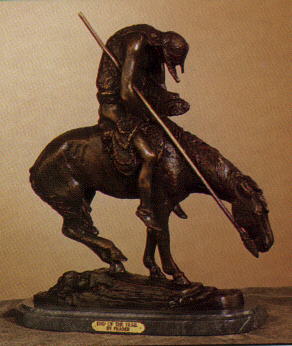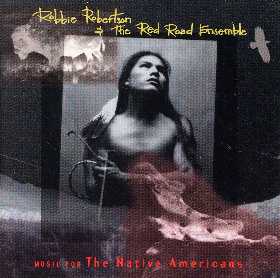 An expanded version of my Indian Comics Irregular essay Natives Sing It Their Way:
An expanded version of my Indian Comics Irregular essay Natives Sing It Their Way: An expanded version of my Indian Comics Irregular essay Natives Sing It Their Way:
An expanded version of my Indian Comics Irregular essay Natives Sing It Their Way:
Ron Fattoruso, PEACE PARTY #1's penciler, suggested we look at songs about Native Americans. Since we aim to cover Native appearances in popular culture, the topic is a good one. How do Indians fare in pop music?
Ron submitted three Native-themed songs by heavy metal groups. One of the groups (Testament) has a Native American lead singer. Here are the lyrics:
Trail of Tears
Testament
See the sun as the day is done
Life is of the broken ones
Some will stray as time will come
All their lives, they live it well
Red man proud and giving hell
Some stand and shining tall
Can you hear them call...
See the sun as it's setting still
Tears fall from a warrior
Damn those who I feel
Set a trail to the promised land
Mother and child holding hand in hand
Through the snow or through the sands
All across the land...
Full moon's rising from the sky, a warrior's riding
Ride with the wind
So far away, the spirits will guide you
No more sorrow
Don't look back, your freedom will follow
Flying so free
Can't you see...on the trail of tears...
Spirit Horse of the Cherokee
Manowar
(narration)
The trail of tears began for the Cherokee
The white men came to trade and borrow
But then they would not leave
Some of us were taken by boat and died at sea
Those of us who lived
Were sold to slavery...
We welcomed them as brothers knowing nothing of their greed
Born hunters, not the hunted, as the white man hunts for me
We are descendants of the animals, we live among them free
Our trail of tears would end one day at Wounded Knee
When we do the Ghost Dance the Buffalo will return
Paint ourselves for war, now blood and fire burn
Great Spirit make us strong, take us to the sky
The Cherokee are brave, we are not afraid to die
Red Cloud, Black Hawk, Sitting Bull
Crazy Horse, Geronimo
Strong and brave, warriors to the grave
There has been much killing, there will be much more
The Medicine Man is dancing, he's calling us to war
Hatchets sing with pride, let the white man die
Great Spirit, Thunder birds fly
We are wild and free
To fight and die by the open sky
Spirit Horse ride for me...
Run to the Hills
Iron Maiden
White man came across the sea
He brought us pain and misery
He killed our tribes, he killed our creed
He took our game for his own need
We fought him hard, we fought him well
Out on the plains we gave him hell
But many came, too much for the Cree
Oh, will we ever be set free?
Riding through dust clouds and barren wastes
Galloping hard on the plains
Chasing the redskins back to their holes
Fighting them at their own game
Murder for freedom, the stab in the back
Women and children the cowards attack
Run to the hills, run for your lives
Soldier blue in the barren wastes
Hunting and killing their game
Raping the women and wasting the men
The only good Indians are tame
Selling them whiskey and taking their gold
Enslaving the young and destroying the old
Run to the hills, run for your lives
Rob's analysis
What can we note about these songs?
On the plus side, they summarize key moments of Native history with reasonable accuracy. They make good use of Indian names, concepts, and events. One can't expect much more in a short slice of music.
And yet, they're still subtly stereotypical. They present and reinforce only one side of the story. Let's see how.
The overwhelming tone of these songs is elegiac. The Indians were strong, brave, and unyielding. They fought against overwhelming forces until, to coin a phrase, they could fight no more (forever). But still they lost.
The imagery reinforces this tone. The setting sun, the trail of tears, running for the hills, fighting to the grave. The message is that Indians are defeated, dead, and gone.
While Indians did lose battles, they also won battles or fought the US Army to a draw. They signed some treaties because both sides were tired of the fighting—not because the Indians were beaten. The reality is more complex than the picture these songs paint.
More important, the end of the free-ranging Indian was only the first book of the saga. Native people continued to live. They adopted representative governments and are now increasing in population and prosperity. They don't need to pray for survival or freedom. They're as alive and as free as any other Americans.
A second theme is the Indian as warrior. All these songs contain martial language. "A warrior's riding"..."hatchets sing with pride"..."We fought him hard, we fought him well." Many Indians, especially those who battled the US Army, were obviously warriors. But many weren't. The Pueblo people, for instance, fought not with "hatchets" but with what we'd call civil disobedience today. Often they resisted passively or simply ran away.1
The image of the Indian brave on horseback is a classic one. Although this figure really existed, it's a stereotype. From fur-swaddled Inuit in snowhouses to Maya priests atop pyramids, it doesn't convey the richness and diversity of Native cultures.
"Ghost Dance"
In contrast, here's a song by Robbie Robertson (Mohawk) and the Red Road Ensemble. It covers roughly the same period and events as the other songs:

Ghost Dance
Robbie Robertson and the Red Road Ensemble
Crow has brought the message
To the children of the sun
For the return of the buffalo
And for a better day to come
You can kill my body
You can damn my soul
For not believing in your god
And some world down below
(chorus)
You don't stand a chance against my prayers
You don't stand a chance against my love
They outlawed the Ghost Dance
But we shall live again, we shall live again
My sister above
She has red paint
She died at Wounded Knee
Like a latter day saint
You got the big drum in the distance
Blackbird in the sky
That's the sound that you hear
When the buffalo cry
(chorus)
Crazy Horse was a mystic
He knew the secret of the trance
And Sitting Bull the great apostle
Of the Ghost Dance
Come on Comanche
Come on Blackfoot
Come on Shoshone
Come on Cheyenne
We shall live again
Come on Arapaho
Come on Cherokee
Come on Paiute
Come on Sioux
We shall live again
"You don't stand a chance"
The differences?
1) A more knowing account of Native history. Crazy Horse and Sitting Bull as mystics and apostles, not just warriors. An idea that the Indian/Anglo clashes were about ideological differences, not just greed. A more thorough listing of Native people. (Not just the Sioux and Apache fought the US.)
2) No invocation of warrior imagery. In "Ghost Dance," prayer and love will win the day. This reflects the deep spiritual grounding of traditional Native cultures. Though Indian tribes fought with each other, harmony rather than supremacy was their overriding goal.
3) Finally, "Ghost Dance" looks forward rather than backward. This isn't an elegy of a defeated people, but rather a prediction of times to come. The tone is similar to that of the civil rights movement, which was also religiously based: "We shall live again," "We shall overcome." There's no doubt in the word "shall" that the outcome will occur.
That's the difference between stereotypical songs, even those presenting honest and valid messages, and nonstereotypical ones. The nonstereotypical songs are deeper with resonance and meaning. They're more real, in other words.
More vanishing Indians in song
From the Guardian, 7/6/07:
Native American reservations
There's no brave music for native peoples, says Yuval Taylor
There's an opposing tradition: the Indian as martyr. Again, you find this in old cowboy, Tin Pan Alley and country songs, but it became much more common in the 1960s and 70s, when we were treated to Johnny Horton's The Vanishing Race, the Raiders' No 1 Indian Reservation, Elton John's overblown Indian Sunset, Cher's No 1 Half Breed, and, of course, at least four Neil Young songs. The protagonists of these songs aren't fierce warriors: they're all Christ-like. A typical example is Joe Ely's much-covered Indian Cowboy, who saves the circus from burning down but dies in the process. The death doesn't seem necessary — why couldn't he have been a living hero? I guess things don't work out that way for Indians.
Notes
1. A correspondent wrote, "Maybe you have forgotten the Pueblo revolts that drove the Spanish away...." To which I responded: No, I haven't forgotten the Pueblo Revolt. My comment was a generalization. I'd say the 1680 revolt is the exception that proves the rule.
Related links
Victor or victim: our new national anthem?
America the warrior society
Readers respond
How accurate was "Spirit Horse of the Cherokee"?
|
. . . |

|
All material © copyright its original owners, except where noted.
Original text and pictures © copyright 2007 by Robert Schmidt.
Copyrighted material is posted under the Fair Use provision of the Copyright Act,
which allows copying for nonprofit educational uses including criticism and commentary.
Comments sent to the publisher become the property of Blue Corn Comics
and may be used in other postings without permission.